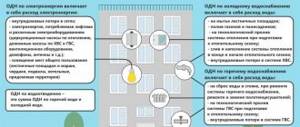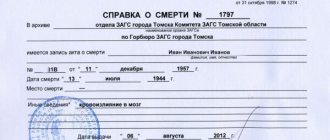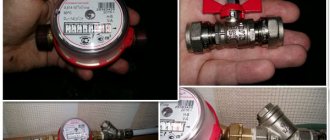Explanation of the abbreviation ODPU
ODPU are called common house metering devices; such equipment is located in apartment buildings and allows you to take into account the consumption of energy resources by residents of the entire apartment building (apartment building).
Each home owner has individual meters installed. But their presence is not enough to fully determine energy consumption. The most effective use of a combination of communal meters with individual ones, which allows, in addition to the resources consumed by residents, to determine the expense attributable to the maintenance of common property.
Housing and communal services news
State policy in the field of use of energy resources follows the path of their accounting by citizens, organizations, government bodies, including in the housing and communal services - owners of premises in apartment buildings and management organizations. In this regard, in 2009, Federal Law No. 261-FZ of November 23, 2009 “On energy saving and increasing energy efficiency and on introducing amendments to certain legislative acts of the Russian Federation” was adopted (hereinafter referred to as Law No. 261).
Article 1 of Law No. 261 establishes that the purpose of this Federal Law is to create a legal, economic and organizational framework for stimulating energy saving and increasing energy efficiency .
In accordance with Article 11 of this law, during the construction of buildings, structures, as well as major repairs of facilities, energy efficiency requirements must be ensured. It is not allowed to commission buildings and structures that do not meet energy efficiency requirements and without equipping them with metering devices for the energy resources used.
That is, from the moment of the adoption of Law No. 261, all apartment buildings put into operation must be equipped with common building (collective) resource metering devices (hereinafter referred to as ODPU ). It should be taken into account that for existing buildings and structures, including apartment buildings, there are also requirements in the law to equip them with ODPU.
Article 13, paragraph 6 of Law No. 261 provides for the obligation of owners of apartment buildings to equip apartment buildings with common house-wide utility metering devices
. Until January 1, 2020, all apartment buildings must be equipped with utility meters. If the owners do not fulfill the obligation to equip the ODPU, then the obligation to install metering devices is imposed by paragraph 9 of Art. 13 of Law No. 261 on resource supply organizations (RSO).
The responsibility of the RSO for failure to comply with the requirements to send proposals to owners of apartment buildings and management organizations of proposals for equipping ODPU is established by part 6 of article 9.16 of the Code of Administrative Offenses of the Russian Federation (CAO RF):
“Failure of organizations obligated to carry out activities related to the installation, replacement, operation of metering devices for used energy resources, the supply or transmission of which they carry out, with the requirement to provide owners of residential buildings, country houses, garden houses, persons representing their interests, owners of premises in multi-apartment houses, to persons responsible for the maintenance of apartment buildings, proposals to equip them with metering devices for used energy resources, if the provision of these proposals to such persons is mandatory - entails the imposition of an administrative fine on officials in the amount of twenty thousand to thirty thousand rubles; for legal entities - from one hundred thousand to one hundred fifty thousand rubles.”
And also part 12 of Article 9.16 of the Code of Administrative Offenses provides for the liability of the RSO for refusal or evasion of the installation of ODPU:
“Unreasonable refusal or evasion of an organization obliged to carry out activities related to the installation, replacement, operation of metering devices for energy resources used, the supply or transfer of which they carry out, from concluding the relevant agreement and (or) from its execution, as well as violation of the established procedure for its conclusion or failure by such an organization to comply with the mandatory requirements established for it for the installation, replacement, and operation of metering devices for used energy resources - entails the imposition of an administrative fine on officials in the amount of twenty thousand to thirty thousand rubles; for persons carrying out entrepreneurial activities without forming a legal entity - from twenty thousand to thirty thousand rubles; for legal entities - from fifty thousand to one hundred thousand rubles.”
Judicial practice on holding resource supplying organizations and officials of the Russian North Ossetia to account under the specified norms of the Code of Administrative Offenses of the Russian Federation is numerous. So, for example, by the Decision of the Arbitration Court of the Tomsk Region in case A67-7573/2013 dated 05/08/2014, upheld by the Resolution of the Seventh Arbitration Court of Appeal dated 07/21/2014, she was brought to administrative liability under Part 12 of Art. 9.16 of the Code of Administrative Offenses of the Russian Federation and a fine of 50,000 rubles was imposed on the heat supply organization Tomskvodokanal LLC.
The court’s conclusions are as follows: “ According to paragraphs 5, 12 of Article 13 of Law No. 261-FZ, until July 1, 2012, owners of residential buildings, with the exception of those specified in Part 6 of this article, owners of premises in apartment buildings put into operation on the day this came into force Federal law is required to ensure that such houses are equipped with metering devices for used water, thermal energy, and electrical energy, as well as putting the installed metering devices into operation. At the same time, apartment buildings within the specified period must be equipped with collective (common building) metering devices for used water, thermal energy, electrical energy, as well as individual and common (for a communal apartment) metering devices for used water, electrical energy.
Until July 1, 2013 (in relation to the facilities provided for in parts 5 and 6 of this article, in terms of equipping them with meters for used water, thermal energy, electrical energy, including equipping apartment buildings with collective (common house) meters for used water, thermal energy , electrical energy, as well as individual and general (for communal apartments) metering devices for used water, electrical energy), the organizations specified in part 9 of this article are obliged to take actions to equip them with metering devices for used energy resources, the supply and transfer of which are carried out by these organizations , facilities whose engineering and technical equipment is directly connected to the engineering and technical support networks belonging to them and which, in violation of the requirements of parts 3 - 6.1 of this article, were not equipped with metering devices for used energy resources within the prescribed period.
By virtue of paragraph 9 of Article 13 of Law No. 261-FZ, from July 1, 2010, organizations that supply water, natural gas, thermal energy, electrical energy or their transmission and whose engineering support networks have direct connection to the networks included in engineering and technical equipment of facilities that are subject, in accordance with the requirements of this article, to be equipped with metering devices for used energy resources, are required to carry out activities for the installation, replacement, operation of metering devices for used energy resources, the supply or transmission of which they carry out.
…The applicant’s argument is that in the resolution of the OFAS on maintenance and the attached materials presented by the prosecutor’s office of the Sovetsky district there are no signs of the offense committed by Tomskvodokanal LLC, provided for in part 12 of article 9.16 of the Code of Administrative Offenses of the Russian Federation, and also that it is impossible to determine from the resolution of the prosecutor of the Sovetsky district The court considers what exactly illegal act, provided for in Part 12 of Article 9.16 of the Code of Administrative Offenses of the Russian Federation, was committed by Tomskvodokanal LLC, is unfounded.
The object of the offense is the system of social relations related to ensuring the accounting of energy resources used and the use of metering devices for energy resources used when making payments for energy resources, which are regulated by Article 13 of Law No. 261-FZ.
The contested resolution contains a description of the event of the offense committed by Tomskvodokanal LLC, which was expressed in non-compliance by the organization, which is obliged to carry out the activity of installing meters for the energy resources used, the supply or transfer of which it carries out, established for it as mandatory requirements for the installation of meters for the energy resources used resources.
The applicant's arguments do not refute the existence of an offense, confirmed by the evidence presented in the case file.
…There is no evidence in the case materials indicating that the enterprise has taken all measures within its power to properly comply with the requirements of the current legislation, as well as evidence indicating the absence of an objective opportunity to comply with them.
The subjects of administrative liability under this part are officials, individual entrepreneurs and legal entities.
The court considers that the applicant’s actions, expressed in violation of the legislation on energy saving and on increasing energy efficiency, in the form of non-compliance with the mandatory requirements established for Tomskvodokanal LLC for the installation of metering devices (a common house cold water meter) for the energy resources used in the house on Ave. Frunze, 116 contain an administrative offense, liability for which is provided for in Part 12 of Article 9.16 of the Code of Administrative Offenses of the Russian Federation .”
Arbitration courts also made similar conclusions in the following judicial acts:
- Decision of the Samara Regional Court dated November 23, 2017 in case No. 21-2410/2017 on dismissing without satisfaction the complaint of an official of a resource supplying organization, head of the electricity metering department of the Sales Directorate of Samara Grid Company JSC, M.S. Bereslavsky. on the decision of the Oktyabrsky District Court and the Resolution of the FAS Office for the Samara Region to bring him to justice under Part 12 of Art. 9.16 of the Code of Administrative Offenses of the Russian Federation and the imposition of punishment in the form of a fine in the amount of 25,000 rubles;
- The decision of the Saratov Regional Court dated November 30, 2017 in case No. 21-703 on upholding and refusing to satisfy the complaint against the decision of the Office of the Federal Antimonopoly Service for the Saratov Region, left unchanged by the decision of the judge of the Kalininsky District Court of the Saratov Region dated September 28, 2020 , on the involvement of the director of the branch of the State Unitary Enterprise SO "Oblvodoresurs-Kalininsky" Molodtsov D.A. found guilty of committing an administrative offense under Part 12 of Article 9.16 of the Code of Administrative Offenses of the Russian Federation, and was given an administrative penalty in the form of an administrative fine in the amount of 20,000 rubles;
- Decision of the Khanty-Mansiysk Arbitration Court dated 02/19/2018 in case No. A75-19807/2017, which denied the application to challenge the decision of the administrative body dated 11/17/2017 on bringing to administrative liability under Part 12 of Article 9.16 of the Code of the Russian Federation about administrative violations of the heat supply organization LLC Oktyabrskoe Housing and Public Utilities and the imposition of an administrative fine in the amount of 50,000 rubles.
Thus, if the RSO servicing an apartment building, after an appeal from the management organization, did not fulfill its obligations to carry out measures to equip the house with ODPU, provided for by Law No. 261, when the owners did not make a decision to install them, the law has a fairly significant lever of influence on the inactive RSO, which may lead to adverse consequences in the form of fines for a legal entity and (or) official.
The management organization is also entrusted with certain responsibilities by Law 261 and other normative legal acts of housing legislation to resolve the issue of installing or replacing ODPU in an apartment building, which should not be neglected.
And only active actions on the part of the management organization, namely: sending proposals to the owners to carry out energy efficiency measures, proposals to the owners for making a decision at the general meeting, as well as organizing a general meeting to resolve issues of installing or replacing the ODPU, financing procedure, etc. d. will lead to the fulfillment of the requirements of Law No. 261.
In addition, the management organization, in the absence of a decision from the owners to install or replace the ODPU, must also send an application to the RSO to install/replace the ODPU, and take a number of other joint actions with the RSO to achieve the goal and avoid bringing it to administrative responsibility, as well as receiving an order from state housing supervision authorities.
Types of metering devices for common house resources
In apartment buildings, various energy resources are consumed, so the appropriate use of meters for each type is required separately.
The need to use ODPU may be related to consumption:
- heat;
- electrical energy;
- household gas for heating, water heating or cooking;
- cold and hot water supply.
In addition to meters, equipment can be installed that allows you to monitor the quality of supplied resources or set modes of their use. For example, a heat meter can be additionally equipped with devices that record the temperature of the coolant and regulate its supply, taking into account the temperature conditions in the premises.
But the use of additional equipment is not included in the mandatory conditions regulated by law. Residents have the right to independently determine the need to install such equipment, taking into account the scale of the upcoming costs for their acquisition and installation.
Requirements for heat and water supply systems
As it turned out, the meters are very sensitive to operating conditions. So as not to have to say that it was the installation of the ODPU that caused all sorts of intractable situations and only added chaos to the matter of paying for utilities, you need to know that the durability and measurement accuracy of the device depend on:
- pipe cleanliness;
- purity of water in the pipeline;
- pressure stability;
- absence of air bubbles in the carrier.
Therefore, it is reasonable to listen to the opinion of a specialist who will advise installing filters in front of the meters, inserting and changing some components, and offer to continue cooperation with him in order to monitor and timely clean and replace parts.
What it is?
A common house metering device (ODPU) is a meter that can be used to determine the costs of water, gas, electricity, and heat energy.
Sometimes, in addition to the main accounting function, the device also performs a distribution function. It is installed in an apartment building and takes into account the resource consumption of residents of the entire building , and not a separate entrance or “riser”.
Features of ODPU installation
The acquisition and installation of ODPU is carried out by the management company. But the decision to install these devices should be made by a general meeting of residents. Representatives of the management company do not have the right to force homeowners to take such a measure, but their responsibilities include motivating consumers with a detailed explanation of the consequences of failure to comply with this step.
The state resorts to setting increased tariffs for energy resources if the residents of apartment buildings have not decided on the need to install communal meters. In this case, the amount of bills may increase by 20 to 60 percent due to the use of increasing factors in calculating the cost of services provided.
These meters are classified as property owned by all residents as common property in the building, therefore the costs of their acquisition and installation are borne by the owners of the apartments in the MKD.
Thermal energy metering unit
The cost of equipment is determined by the following factors:
- scale of consumption and other technical characteristics required for devices;
- characteristics of the MKD area and number of apartments;
- equipment parameters;
- model and place of manufacture of the device;
- placement features and installation complexity.
The development of documents for the installation of devices and the selection of a suitable device model is the responsibility of the management company.
Typically, these devices are located in the basement of the house, in conditions that ensure proper and safe operation of the equipment, which is convenient, given the location of the main energy communications there. The exception applies to electricity meters that are located in switchboard rooms that are equipped for these purposes, if they are present in the house.
Why are we required to install heat meters?
There is an order from the Ministry of Energy describing the procedure for installing ODPU. In accordance with it, home owners or a management organization deliver an application with a request to the RSO. The following documents certify the seriousness of the decision:
- Copies of documents confirming ownership.
- Constituent documents.
- A copy of the registration certificate from the registry authority.
- Registration document from the tax office.
- Power of attorney of the owners in the name of the person who signed the application.
After accepting these documents, the RSO has ten working days to inspect the building in the presence of a representative from the public. Then, within 15 days, the organization draws up and submits an agreement to the management organization (MA) or owners. The general meeting discusses it and no later than 15 days later returns the agreement with the signature of the responsible person to the RSO.
The law provides with regard to the installation of ODPU that this does not apply to:
- emergency houses;
- buildings to be demolished;
- premises that do not have technical conditions for proper operation and safety of devices;
- buildings with a volume of gas used no more than 2 m3/h;
- houses that consume a maximum of 5 kW/h of electricity;
- rooms that absorb no more than 0.2 Gcal/h of heat.
For many, it is unclear why spend money on installing expensive equipment for recording consumption volumes, if almost every apartment has individual devices. According to utility workers, this measure is beneficial to residents of apartment buildings:
How are tariffs calculated for ODPU
In addition to the consumption of resources consumed directly to provide apartments and accounted for by individual meters, in any building there are places used by all residents - rooms for storing equipment, strollers, corridors, staircases and others.
We recommend: Electric meter plugs
Household devices for monitoring the resources used make it possible to calculate the cost indicators for the maintenance of such premises and the amount of the required payment.
To calculate such costs, the following formula is used:
Rho = (P – Rind)×T,
wherein:
- Rho – the estimated amount of payment for the maintenance of public places;
- P – total flow rate determined by ODPU;
- Rind is the total consumption of energy resources based on the readings of individual metering devices;
- T – the size of the tariff for the corresponding resources.
In order to interest residents in purchasing and using ODPU, the state, in addition to tariffs, provides for the use of increasing coefficients assigned to residents of buildings that do not have communal meters installed.
How does the procedure for calculating payments for utilities change after installing a meter?
If an ODPU is installed, after installation the company is given 1 month for commissioning. During this time, the management company must calculate the amount of payment in accordance with clause 81 of Decree of the Government of the Russian Federation No. 354, where meter readings are taken into account.
When the ODPU is installed, but some apartments are not equipped with individual metering devices, fees are calculated according to the formulas specified in Appendix 32 to the Resolution. In order for expenses to be taken into account, the indicators of general meters are used.








